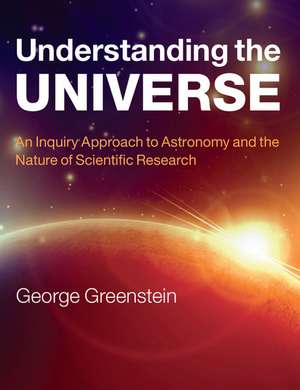Understanding the Universe: An Inquiry Approach to Astronomy and the Nature of Scientific Research
Autor George Greensteinen Limba Engleză Paperback – 17 feb 2013
Preț: 353.35 lei
Preț vechi: 434.75 lei
-19% Nou
Puncte Express: 530
Preț estimativ în valută:
67.62€ • 70.17$ • 56.52£
67.62€ • 70.17$ • 56.52£
Carte indisponibilă temporar
Doresc să fiu notificat când acest titlu va fi disponibil:
Se trimite...
Preluare comenzi: 021 569.72.76
Specificații
ISBN-13: 9780521145329
ISBN-10: 0521145325
Pagini: 658
Ilustrații: 513 b/w illus. 39 colour illus. 297 exercises
Dimensiuni: 213 x 280 x 24 mm
Greutate: 1.43 kg
Ediția:New.
Editura: Cambridge University Press
Colecția Cambridge University Press
Locul publicării:Cambridge, United Kingdom
ISBN-10: 0521145325
Pagini: 658
Ilustrații: 513 b/w illus. 39 colour illus. 297 exercises
Dimensiuni: 213 x 280 x 24 mm
Greutate: 1.43 kg
Ediția:New.
Editura: Cambridge University Press
Colecția Cambridge University Press
Locul publicării:Cambridge, United Kingdom
Cuprins
Part I. Steps to Astronomy: 1. The sky; 2. The origins of astronomy; 3. Gravity and orbits; 4. Light; 5. The astronomers' tools: telescopes and space probes; Part II. The Solar System: 6. Introducing the Solar System; 7. The inner Solar System; 8. The outer Solar System; 9. Smaller bodies in the Solar System; 10. Planets beyond the Solar System; Part III. Stars: 11. Our Sun; 12. A census of stars; 13. The formation of stars and planets; 14. Stellar structure; 15. Stellar evolution and death; Part IV. Galaxies and the Universe: 16. The Milky Way galaxy; 17. Galaxies; 18. Cosmology; 19. Life in the Universe; Index.
Recenzii
'… an inquiry approach that explores the nature of scientific research sets this book apart from other textbooks. The readings and exercises are scaffolded to allow the students to build their own understanding of the big ideas in astronomy. The separation into different math levels makes it appropriate for a wide range of classes. I really liked the problem sets that required students to describe the logic behind their solutions.' Mary Kay Hemenway, University of Texas, Austin
'I have looked over the book and am impressed by what I see. Greenstein's new book is a compelling and powerful introduction to astronomy, laying bare the fundamentals of scientific arguments and the scientific process.' Steven Furlanetto, University of California, Los Angeles
'Understanding the Universe delivers on its promises. It is indeed inquiry based, and overtly uses astronomy as a means to explore the nature of science. We 'Astro 101' teachers often describe our efforts as attempts to show how science operates, but then fail to teach that way. We revert to what Greenstein describes as the 'shut up and learn' mode. This uniquely personal book, conventional in its structure, but unconventional in its insistence on clear and conversational explanations of core concepts, is a noble attempt to get the students to do the learning. Greenstein's text does not merely tell students about the Universe; it helps them understand the Universe.' Bruce Partridge, Haverford College, Pennsylvania
'George Greenstein has done an excellent job of clearly explaining the most important aspects of astronomy. His book brings the reader along on a journey of discovery and treats 'what we know' and 'how we know' as equally important. Exhorting students to actively participate rather than passively memorize reinforces a message that almost all instructors send. I encourage my colleagues teaching introductory astronomy to consider this book carefully.' Pauline Barmby, Western University, Ontario
'This unique text provides a superb framework for introducing students to the approaches scientists take to solving problems. By posing a variety of 'mysteries' faced by both ancient and contemporary astronomers, gathering and presenting data, searching for patterns, asking questions, posing and testing hypotheses both qualitatively and quantitatively, Greenstein introduces his readers to the tools of the detective-scientist.' Stephen Strom, National Optical Astronomy Observatory
'… an introductory textbook to be used in an astronomy course for nonscience majors, and I would definitely recommend it for that purpose …' Physics Today
'I have looked over the book and am impressed by what I see. Greenstein's new book is a compelling and powerful introduction to astronomy, laying bare the fundamentals of scientific arguments and the scientific process.' Steven Furlanetto, University of California, Los Angeles
'Understanding the Universe delivers on its promises. It is indeed inquiry based, and overtly uses astronomy as a means to explore the nature of science. We 'Astro 101' teachers often describe our efforts as attempts to show how science operates, but then fail to teach that way. We revert to what Greenstein describes as the 'shut up and learn' mode. This uniquely personal book, conventional in its structure, but unconventional in its insistence on clear and conversational explanations of core concepts, is a noble attempt to get the students to do the learning. Greenstein's text does not merely tell students about the Universe; it helps them understand the Universe.' Bruce Partridge, Haverford College, Pennsylvania
'George Greenstein has done an excellent job of clearly explaining the most important aspects of astronomy. His book brings the reader along on a journey of discovery and treats 'what we know' and 'how we know' as equally important. Exhorting students to actively participate rather than passively memorize reinforces a message that almost all instructors send. I encourage my colleagues teaching introductory astronomy to consider this book carefully.' Pauline Barmby, Western University, Ontario
'This unique text provides a superb framework for introducing students to the approaches scientists take to solving problems. By posing a variety of 'mysteries' faced by both ancient and contemporary astronomers, gathering and presenting data, searching for patterns, asking questions, posing and testing hypotheses both qualitatively and quantitatively, Greenstein introduces his readers to the tools of the detective-scientist.' Stephen Strom, National Optical Astronomy Observatory
'… an introductory textbook to be used in an astronomy course for nonscience majors, and I would definitely recommend it for that purpose …' Physics Today
Notă biografică
Descriere
A student-active introduction to astronomy, emphasizing inquiry learning so students will clearly understand how our universe and science work.
